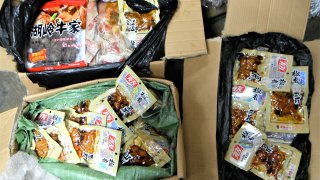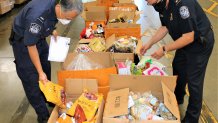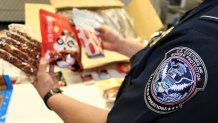
What to Know
- Seizures of contraband meats from China at the LA/LB seaport complex is still on the rise after rates doubled in fiscal year 2021.
- According to the United States Department of Agriculture, China is affected by African Swine Fever.
- ASF-affected countries may introduce the virus to the U.S., potentially crippling the domestic pork industry and U.S. pork exports valued at $6.5 billion annually.
Confiscations of prohibited meat products from China shipped to the Los Angeles/Long Beach seaport complex in the first quarter of the fiscal year 2022 saw a 33% increase from the same period last year.
Spanning October through December 2021, agriculture specialists seized 262,237 pounds of prohibited pork, chicken, beef and duck products, according to the U.S. Customs and Border Protection.
Officials say this rate marks levels never before seen for such illicit activity.
Get top local stories in Southern California delivered to you every morning. >Sign up for NBC LA's News Headlines newsletter.
This comes after contraband meat shipments from China to LA doubled in the fiscal year 2021.

Coinciding with the COVID-19 pandemic, the volume of banned animal products seized at the LA/LB seaport reached a record 786,514 pounds, up 80% from the previous year, authorities said.
Local
Get Los Angeles's latest local news on crime, entertainment, weather, schools, COVID, cost of living and more. Here's your go-to source for today's LA news.
Also in the fiscal year 2021, 1,049 Emergency Action Notifications were issued by federal agents in LA. This is compared to 527 notifications issued in 2019.
"Preventing the introduction of foreign contagious animal diseases and noxious pests at our nation's largest seaport is paramount and vital to our agriculture industry and the well-being of the communities we serve,'' Carlos C. Martel, CBP director of field operations in Los Angeles, said in a statement.
"We work closely with our USDA and private-sector partners to protect the nation from a variety of diverse agriculture threats,'' Martel said.
According to the United States Department of Agriculture, China is affected by African Swine Fever, Classical Swine Fever, virulent Newcastle Disease, Foot and Mouth Disease, Highly Pathogenic Avian Influenza and Swine Vesicular Disease.
Pork products from ASF-affected countries may introduce the virus to the United States, potentially crippling the domestic pork industry and U.S. pork exports valued at $6.5 billion annually, authorities said.
CBP agriculture specialists found most of the prohibited animal products mixed in boxes of e-commerce shipments and household goods -- in an attempt to smuggle the meats into the country, authorities said.

"CBP plays a major role in protecting American consumers and the agriculture industry from pests and diseases,'' said Donald R. Kusser, CBP Port Director of the Los Angeles/Long Beach Seaport.
"These unprecedented numbers reflect the critical role and outstanding contributions of CBP's agriculture specialists, (who) have been working tirelessly identifying, intercepting and seizing these prohibited items,'' Kusser said.



